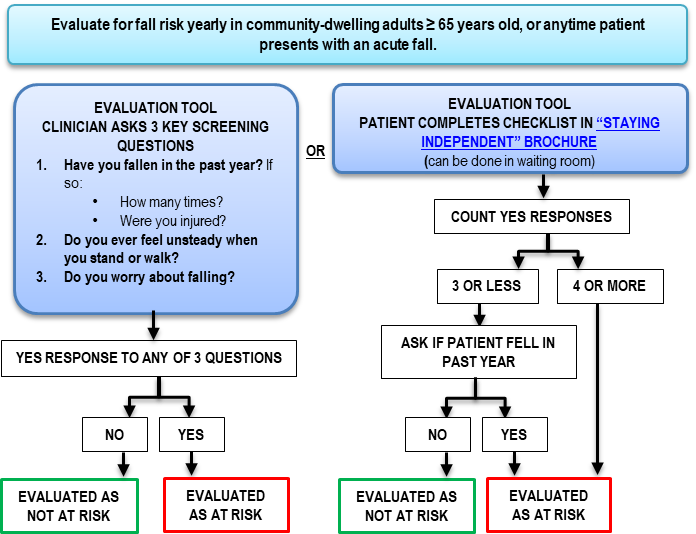Not known Details About Dementia Fall Risk
Not known Details About Dementia Fall Risk
Blog Article
The Facts About Dementia Fall Risk Revealed
Table of ContentsDementia Fall Risk Things To Know Before You BuyThe Definitive Guide for Dementia Fall RiskGetting The Dementia Fall Risk To WorkAbout Dementia Fall RiskTop Guidelines Of Dementia Fall Risk
The FRAT has three sections: fall risk status, threat variable list, and activity plan. A Fall Risk Standing consists of data regarding history of current falls, medicines, psychological and cognitive status of the person - Dementia Fall Risk.If the patient ratings on a threat aspect, the matching number of factors are counted to the individual's fall threat rating in the box to the far. If a patient's loss risk rating completes five or greater, the person goes to high danger for falls. If the person scores just four factors or reduced, they are still at some threat of falling, and the registered nurse must use their finest medical assessment to handle all fall danger elements as component of an alternative care plan.
These standard methods, in general, assist create a safe atmosphere that minimizes accidental falls and defines core safety nets for all patients. Indications are essential for patients in danger for falls. Doctor require to recognize who has the condition, for they are in charge of carrying out activities to promote client security and stop drops.
The Only Guide to Dementia Fall Risk
For instance, wristbands need to include the individual's last and given name, date of birth, and NHS number in the UK. Information ought to be printed/written in black against a white history. Only red shade ought to be made use of to signify special client condition. These referrals are consistent with present advancements in individual identification (Sevdalis et al., 2009).
Things that are as well much may call for the individual to reach out or ambulate needlessly and can potentially be a danger or contribute to falls. Aids stop the client from heading out of bed without any type of aid. Nurses react to fallers' call lights quicker than they do to lights started by non-fallers.
Visual disability can greatly cause falls. Maintaining the beds closer to the flooring lowers the risk of falls and severe injury. Positioning the mattress on the floor considerably lowers fall danger in some medical care settings.
The 4-Minute Rule for Dementia Fall Risk
Clients who are high and with weak leg muscle mass that try to remain on the bed from a standing position are weblink most likely to drop onto the bed because it's also low for them to lower themselves safely. Additionally, if a high person efforts to rise from a reduced bed without assistance, the person is likely to fall back down onto the bed or miss out on the bed and fall onto the floor.
They're developed to promote prompt rescue, not to stop falls from bed. Audible alarms can also advise the patient not to stand up alone. The usage of alarms can likewise be an alternative to physical restrictions. Besides bed alarm systems, increased supervision for high-risk people additionally might assist prevent falls.

Clients with an evasion gait rise autumn chances significantly. To lower autumn risk, footwear should be with a little to no heel, slim soles with slip-resistant walk, and sustain the ankle joints.
The 5-Minute Rule for Dementia Fall Risk
In a study, homes with sufficient lighting record less drops (Ramulu et al., 2021). Renovation in illumination at home may decrease fall rates in older grownups.
.png)
Caretakers are efficient for guaranteeing a secure, safeguarded, and risk-free environment. Nonetheless, research studies demonstrated really low-certainty evidence that caretakers minimize fall threat in severe treatment health centers and just moderate-certainty that alternatives like video clip monitoring can lower caretaker use without boosting autumn risk, recommending that sitters are not as valuable as initially thought (Greely et al., 2020).
The Greatest Guide To Dementia Fall Risk

Raised click to read physical conditioning decreases the danger for drops and restricts injury that is suffered when loss takes place. Land and water-based workout programs may be similarly valuable on equilibrium and gait and thus minimize the threat for drops. Water workout may contribute a positive benefit on balance and stride for ladies 65 years and older.
Chair Surge Workout is a basic sit-to-stand workout that aids strengthen the muscles in the thighs and buttocks and improves wheelchair and this article self-reliance. The objective is to do Chair Surge exercises without using hands as the client becomes stronger. See resources section for an in-depth direction on just how to execute Chair Surge exercise.
Report this page